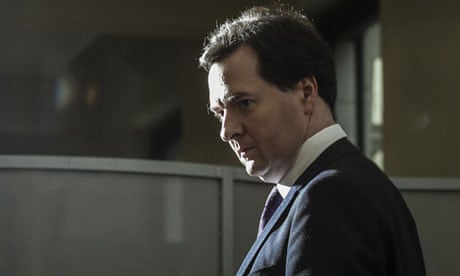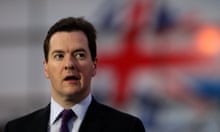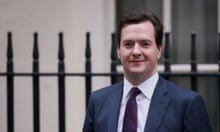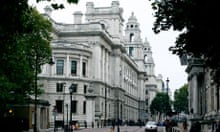George Osborne will be forced into an embarrassing climbdown over next month's budget by having to admit that borrowing this year will go up, not down, according to his own independent tax and spending watchdog.
Less than three months after the chancellor insisted in his autumn statement that the government's austerity programme would ensure the budget deficit fell every year, the Office for Budget Responsibility signalled that lower tax receipts and higher spending meant it was unlikely that the borrowing forecasts would be met.
The OBR, which is drawing up economic and public finance forecasts for the budget on 20 March, presented its gloomy analysis after the release of unexpectedly good data which showed the exchequer in credit by £11.4bn last month – the second highest January surplus on record.
But the watchdog said there would have to be a marked improvement in the final two months of the 2012-13 financial year to meet the forecast in December's statement which said borrowing would fall from £121.4bn to £119.9bn this year.
Osborne had used the OBR forecast to wrongfoot his Labour shadow, Ed Balls, at the autumn statement.
The OBR said on Thursday that borrowing would have to be £6.4bn lower than last year, in February and March, to hit the £119.9bn figure, which excludes the transfer to the Treasury of the Royal Mail pension fund and the profits made by the Bank of England on its purchases of gilts under the quantitative easing programme.
"The proceeds from the 4G spectrum auction will reduce borrowing by £2.3bn in the remainder of the year," the OBR said. "Nonetheless, to meet our autumn forecast would now require much stronger growth in tax receipts in the last two months of the year than we have seen since December, or much lower-than-forecast expenditure by central or local government."
Osborne controversially included an expected £3.5bn from the sale of the 4G mobile services licences in his autumn statement, thereby ensuring that borrowing fell between 2011-12 and 2012-13.
A Treasury spokesman said: "Today's public-sector finances show an improvement on last year. They underline what the governor of the Bank of England said last week: the road ahead will be difficult, but the economy is on the right track. The deficit has been cut by a quarter in two years and over a million private-sector jobs have been created."
Chris Leslie, shadow financial secretary to the Treasury, said: "Strip away the smoke and mirrors – like the transfer of cash from the Bank of England – and underlying borrowing so far this year is rising and is £5.3bn higher than the same period last year.
"A flatlining economy means the government is borrowing more to pay for economic failure as the welfare bill is up. By failing on growth and jobs, David Cameron and George Osborne are failing on the one test they set themselves – to get the deficit and debt down."
Separate analysis from the Institute for Fiscal Studies, the UK's leading thinktank on public finances, suggested that after a year of flat output, borrowing in 2012-13 would be £7bn higher than in 2011-12.
Rowena Crawford, an IFS researcher, said: "As the chancellor prepares for his budget next month, he will likely be disappointed by today's public finance figures."
January tends to be one of the year's biggest months for tax collection, and the surplus last month was higher than in the same month a year earlier, even when special factors such as the £3.8bn payment by the Bank to the Treasury of QE profits were taken into account.
Stripped of all the special factors the government was in the black by £7.8bn in January 2013, up from £6.4bn in January 2012.
But Crawford said tax receipts were running below the growth forecast for the year as a whole, while spending continued target as a result of welfare benefit payments and higher outlays by Whitehall departments.
"As a result borrowing is now on course to be almost £7bn higher this year than the OBR forecast in December.
Therefore borrowing is more likely to be slightly higher rather than slightly lower than last year's level, although much uncertainty remains and things could still change in the final two months of the year."
Further austerity would be needed if the outlook for the deficit failed to improve, Crawford added. "What matters more than the level of borrowing this year is the outlook for revenues and spending in the medium term. Some of the extra borrowing so far this year is due to Whitehall departments under-spending by less than assumed.
"This may not persist and therefore might not concern the chancellor, in particular if the money is being spent well. Potentially more concerning is the low growth in tax receipts and the high growth in spending on welfare benefits: were these to persist in to future years then the planned fiscal tightening might need to be increased."









Comments (…)
Sign in or create your Guardian account to join the discussion